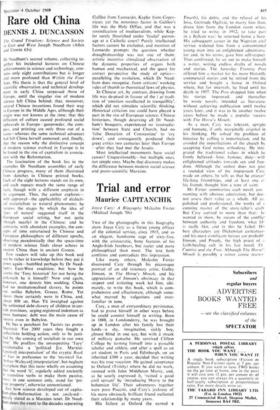Rare old China
DENNIS J. DUNCANSON
The Grand Titration: Science and Society in East and West Joseph Needham (Allen and Unwin 63s)
Dr Needham's second volume, collecting to- gether his incidental lectures on Chinese achievements in science and technology, con- tains only eight contributions but is longer and more profound than Within the Four Seas. His thesis is that the general level of scientific observation and technical develop- ment in early China surpassed those of Europe, until the singular rise of modern science left China behind; that, moreover, several Chinese inventions found their way to Europe in the Middle Ages, although their origin was not known at the time; that this diffusion of culture caused profound social upheavals in Europe—gunpowder, the com- pass, and printing are only three out of a score—whereas the same technical advances had left China herself unmoved; and, finally, that the reason why the distinctive concept of modern science evolved in Europe is to be found in the rise of capitalism in associa- tion with the Reformation.
The fascination of the book lies in the examples Dr Needham assembles of early Chinese progress, many of them illustrated from sketches in Chinese printed books. Each of the eight lectures stands on its own, and each repeats much the same range of facts, though with a different emphasis in its argument.. Thus, the author explores— with approval—the applicability of dialecti- cal materialism to natural phenomena; he reviews the stages by which the idea of 'laws of nature' suggested itself in the European social setting, but not quite (though nearly) in the Chinese; and he contrasts, with abundant examples, the con- cepts of time entertained by Chinese and European philosophers of different epochs, observing paradoxically that the space-time of modern science finds closer echoes in ancient China than in ancient Greece.
Few readers will take up this book and not be richer in knowledge before they put it down again—humbled perhaps by Dr Need- ham's East-West erudition; but how he scorns the 'Tory historian' for not being the polymath he is himself! Now and again, however, one detects him nodding. China had no institutionalised slavery, he points out, unlike Babylon, Greece, Rome. Yet slaves there certainly were in China, and, about 800 AD, Han Yti inveighed against the unlimited debt-slavery of children in cer- tain provinces, urging registered indenture as more humane; debt was the main cause of slavery even in Babylon.
He has a penchant for Taoists (as proto- Maoists): 'For 2000 years they fought a collectivist holding action, only to be justi- fied by the coming of socialism in our own time'. He proffers the unsuspecting 'Tory' occidentalist a 'political [i.e. Marxist- Leninist] interpretation' of the cryptic Book of Tao in preference to the 'mystical (i.e. Arthur-Waleyan] interpretation', but neglects to explain that this turns wholly on assuming that the word 'it', regularly added anciently o transitive verbs to make them passive, wit. in one sentence only, stand for 'on- ate property', otherwise unmentioned.
Just how science developed out of capita- sm-plus-Reformation is not analysed- erely stated as a Marxian tenet. Dr Need- am dates the event to the decades separating
Galileo from Leonardo, Kepler from Coper- nicus; yet the notorious factor in Galileo's life was the Holy Office, and that was a revendication of mediaevalism, while Kep- ler surely flourished under 'feudal' patron- age at a Catholic court? Purely intellectual factors cannot be excluded, and mention of Leonardo prompts the question whether draughtsmanship was not one of them: artistic incentive stimulated observation of the dynamic properties of organs both human and mechanical, and the quest for correct perspective the study of optics— paralleling the evolution, which Dr Need- ham does recognise, from artisans' working rules of thumb to theoretical laws of physics.
In Chinese art, by contrast, drawing from life was despised in favour of the i pi tradi- tion of 'emotion recollected in tranquillity', which did not stimulate scientific thinking. Historical criticism too could have played a part in the rise of European science: Chinese historians, though deserving all Dr Need- ham's bouquets, experienced no 'contradic- tion' between State and Church, had no 'false Donation of Constantine' to 'cry down', and consequently produced their great critics two centuries later than Europe —after they had met the Jesuits.
Must intellectual movements have social causes? Unquestionably—but multiple ones, not simple ones. Maybe that discovery makes the difference between modern social science and proto-scientific Marxism.


































 Previous page
Previous page